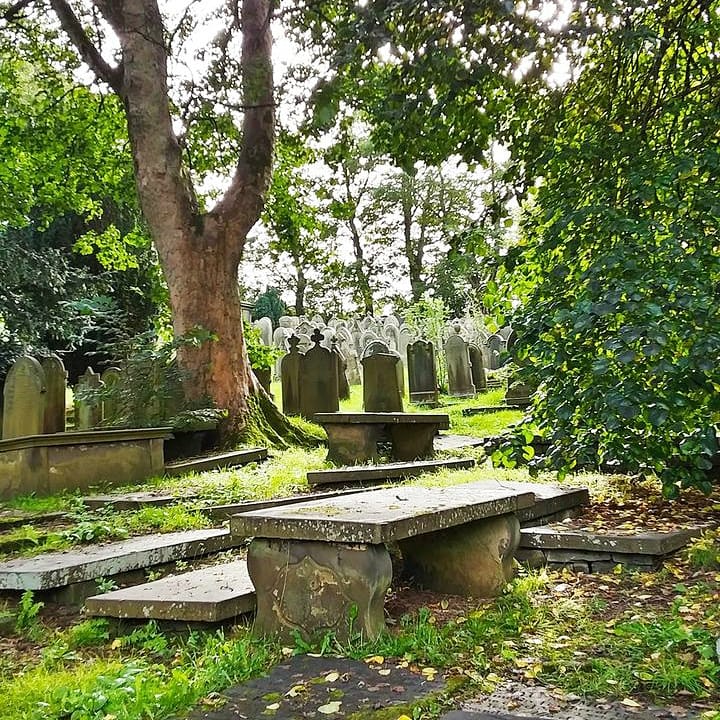
God In Our Goodbyes
Share

“Bye-bye,” Alex and I were saying to our friend Frank, who had dropped us off outside our campus apartment for the last time and was waving to us from the window of his car. Frank is a 78-year-old widower we met at our church in North Yorkshire. From the beginning of our acquaintance, he took us in with robust hospitality, hosting us at his home for dinner and treating us to fragrant meals at his favorite Indian and Chinese restaurants. Frank’s wife Dorothy had passed away just months before Alex and I arrived in England, and the shadow of her loss followed Frank everywhere like a new, not-entirely-welcome friend who was tender and somber by turns. “Make sure you love each other,” he told us gravely as we sat drinking coffee after putting away a spread of fried rice and sweet-and-sour vegetables at Maxi’s Chinese Restaurant. “You think you have forever, but you don’t.”
~
We met Frank when we all began attending the same weekly discussion group. The meetings were hosted by our vicar, a generous, faithful, and intellectually honest Dutch man with a young family and a fondness for bird-watching. Alex and I attended the group because we wanted to develop friendships with local British people. Frank came because he wanted to hear more about the Resurrection. He said he didn’t know if he could believe it—all that about Jesus coming back from the dead. At the meetings, we always ate fresh crusty bread, assorted cheeses, and vegetable soup around the vicar’s dining table. We talked about birds, Brexit, and the proper way to eat pancakes. Afterwards, we gathered in the living room and talked about stickier things: What are we here for? Where are we going? Is there a God? Frank was curious and never cautious in our talks. He tended to be startlingly open about what he was thinking. He plainly was not afraid of shocking God or of facing divine retribution for not being able to securely stow away this or that core doctrine in a mental vault of unquestionable things.
~
“We’ll see you again!” we said to Frank as he pulled his sports car out of the parking lot next to the bus stop in the final week of our long sojourn in England. As I watched him drive off, I felt grief rising up in me like a tidal wave. Alex put his hands on either side of my face and peered into it as he customarily does when he senses an ache in me. “Why sad?” he asked me with the childish gentleness we two have come to practice in our interrogation of one another’s sorrows. “It’s just an eerie feeling,” I told him through tears, “saying goodbye to someone who’s old, and knowing you’ll never see them again.” Then God met me. I don’t know how to describe it other than to say that God is in our goodbyes, and smack dab in the middle of that gaping loneliness, there God was. I think that when the soul knows it’s bidding goodbye for the very last time, it lunges at the bars of this mortality; and it’s in that darkness that we hear it just a fingertip away: the breath of GOD.
I am a Christian, and as such, I am supposed to feel sure that God exists and is in every place. But I’d be lying if I said there aren’t entire days, and many of them, when I’m afraid we’ve made this whole God thing up because we’re just too scared to face the horrors of bloody nature and our own mortality. I am the sort of person who likes to know the worst and make the best of it, who hates above all things to be left in suspense. But I’m discovering that living itself is one long round of suspense. Every morning I wake up not knowing if my husband will die in a wreck on I-30 or my mom will be diagnosed with cancer. Every year, as W.S. Merwin reminds me, I have passed without knowing it the anniversary of my death, and we have received no word from that undiscovered country. I shrink instinctively from unfounded optimism, and perhaps this is why I spend a lot of time feeling unsure how to approach all our biggest questions. But there are times when the protective curtains of doubt part before my eyes in an instant, and I find myself wholly confident that these connection-craving souls of ours are fashioned out of the stuff of the divine; that all this light and smile and wild loving can’t end in dirt; that the breath of God does in fact move through our lungs and shall fill them again. Standing there next to the bus stop and watching the night close around Frank’s retreating car, I thought about how the starful space around us is big beyond any words we’ve yet invented, and I felt God slip a warm, eternal hand into mine.
~
On that day back in March when the Church of England announced the suspension of all their services due to the rapid global spread of COVID-19, our discussion group held its final meeting in a cozy library nook inside the church building. Our vicar was ill, and couldn’t be there, and the number of attendees was much smaller than usual. We microwaved canned soup from the church pantry and ate it in a circle, sitting six feet apart. There was a sense of impending distress hanging over us, but we didn’t know we were about to go into a nationwide lockdown and wouldn’t enter a church building or see each other again for a solid four months. The topic on the table was death, and what, if anything, comes after.
I think I shall never forget that sweet, mysterious night. It was as though our small group had gathered on a threshold spot hovering between two distinct realms. We were firmly planted in a time and a place on Planet Earth, but we could put our noses out and smell the Great Beyond the way you can smell an ocean before it ever comes into view. When it was Frank’s turn to speak, he began telling us his great story, the one that had been always bubbling up in him ever since we met. It was, of course, the story of Dorothy: her beautiful heart, her painful illness, her ashes released to the wind. He wept the way you weep over something too terrible to be true, and he seemed as frail as a broken reed, but too thick and human to be anything but undying. How we all loved him. How we loved each other. How we wanted to go on caring for each other like that always, a little circle holding hands around the bright beam of Jesus. “When I started coming to this group,” Frank said, “I was convinced there could be no resurrection. But now—well, all I can say is now I don’t feel so sure. Now I don’t know.”
[This reflection was written specifically for the Winter 2020 issue of Cultivating and first published there in December 2020.]
